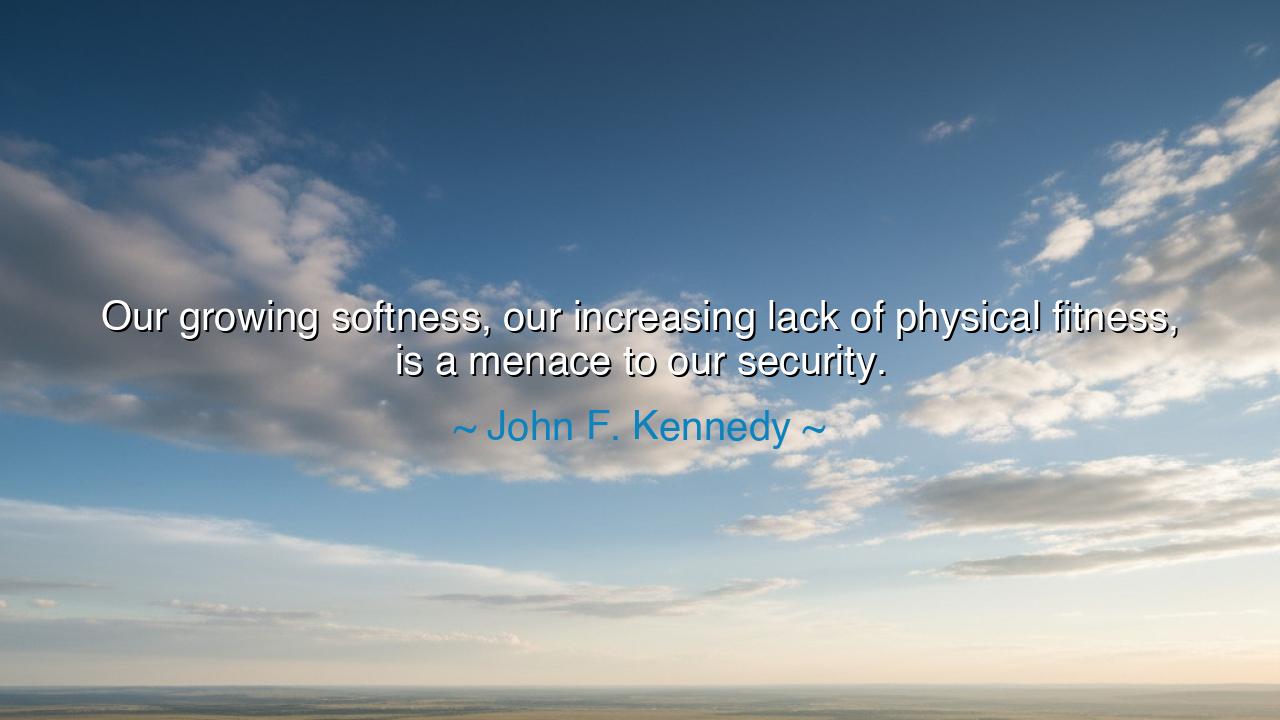
Our growing softness, our increasing lack of physical fitness, is
Our growing softness, our increasing lack of physical fitness, is a menace to our security.






Host: The room feels sharp, almost charged, as if the conversation is about to touch on important topics of health, discipline, and societal well-being. The soft evening light fills the space, but there’s an air of seriousness, as though we’re about to dive into a more intense reflection. Outside, the world continues its usual rhythm, but inside, the conversation feels like it’s preparing to address the importance of physical fitness and its broader implications. Jeeny sits at the table, her fingers lightly tracing the rim of her cup, her expression thoughtful. Jack stands near the window, arms crossed, looking out at the street below.
Jeeny: (her voice gentle, yet filled with curiosity) “You ever think about how our physical health is tied to much more than just feeling good or looking good? How our fitness, or lack of it, can have a much deeper impact on our overall well-being and even the security of our communities?”
Jack: (glancing over at her, his voice dry, but intrigued) “Fitness and security? Yeah, it’s easy to think about health as a personal thing, but it’s true—our physical fitness, or lack thereof, can affect not just us individually, but the strength of society as a whole. What made you think about it?”
Jeeny: (nodding slowly, a small smile forming as she shares her thought) “I was thinking about something John F. Kennedy said: ‘Our growing softness, our increasing lack of physical fitness, is a menace to our security.’ It made me reflect on how important fitness is, not just for individual health, but for the strength and resilience of our entire nation. When people aren’t physically fit, it affects more than just their personal well-being—it has consequences on national security, too.”
Jack: (pauses, considering her words carefully) “So, he’s saying that the decline in physical fitness isn’t just a personal issue—it’s a larger societal issue? That our physical strength, or the lack of it, affects more than just our ability to stay healthy; it affects our ability to function as a nation, to be resilient in the face of challenges?”
Jeeny: (smiling more deeply now, her eyes steady as she explains further) “Exactly. Kennedy’s point is that physical fitness is directly tied to national security. When we neglect our health, we weaken ourselves individually and collectively. Being physically fit isn’t just about looking good or feeling better—it’s about being strong enough to face challenges, to respond to crises, and to keep our society functioning effectively. It’s about resilience.”
Host: Jeeny’s words seem to linger in the room, creating a subtle shift in the conversation about the broader implications of fitness. Jack stands still, his expression softening as he processes the deeper message behind Kennedy’s statement. The world outside continues its rhythm, but inside, the conversation feels rooted in a more profound understanding of health, fitness, and societal strength.
Jack: (his voice quieter now, almost reflective) “I see what he means. It’s easy to overlook how our personal health affects the bigger picture. But in reality, the state of our physical fitness impacts everything—our communities, our economy, even our ability to defend ourselves or respond to emergencies. Fitness isn’t just about individuals—it’s a foundational element of society.”
Jeeny: (nodding slowly, her voice calm, yet filled with quiet strength) “Exactly. Fitness is more than a personal goal—it’s a societal responsibility. The healthier and stronger we are as individuals, the stronger and more resilient our communities will be. It’s about building a foundation of health that benefits everyone, not just ourselves.”
Jack: (pauses, a small smile forming on his face as the idea sinks in) “It’s liberating, isn’t it? To realize that our physical health isn’t just about us—it’s about the strength and security of the world around us. The more we focus on staying healthy, the stronger and more resilient society becomes.”
Jeeny: (smiling warmly, her voice gentle, yet filled with wisdom) “Exactly. Our individual health is an investment in the health of the community. When we take care of ourselves, we’re also contributing to the well-being of the world around us. Physical fitness isn’t just personal—it’s national, even global.”
Host: The room feels lighter now, as though the conversation has shifted into a deeper understanding of the connection between personal fitness and societal strength. Jack turns from the window, his posture more relaxed, his thoughts clearly reflecting on the broader impact of fitness on the world. Jeeny watches him, content in the realization that our individual health is intricately tied to the resilience of society. The world outside continues its rhythm, but inside, there’s a shared understanding that physical fitness is not just for us—it’s a cornerstone of the strength and security of our communities and nations.






AAdministratorAdministrator
Welcome, honored guests. Please leave a comment, we will respond soon